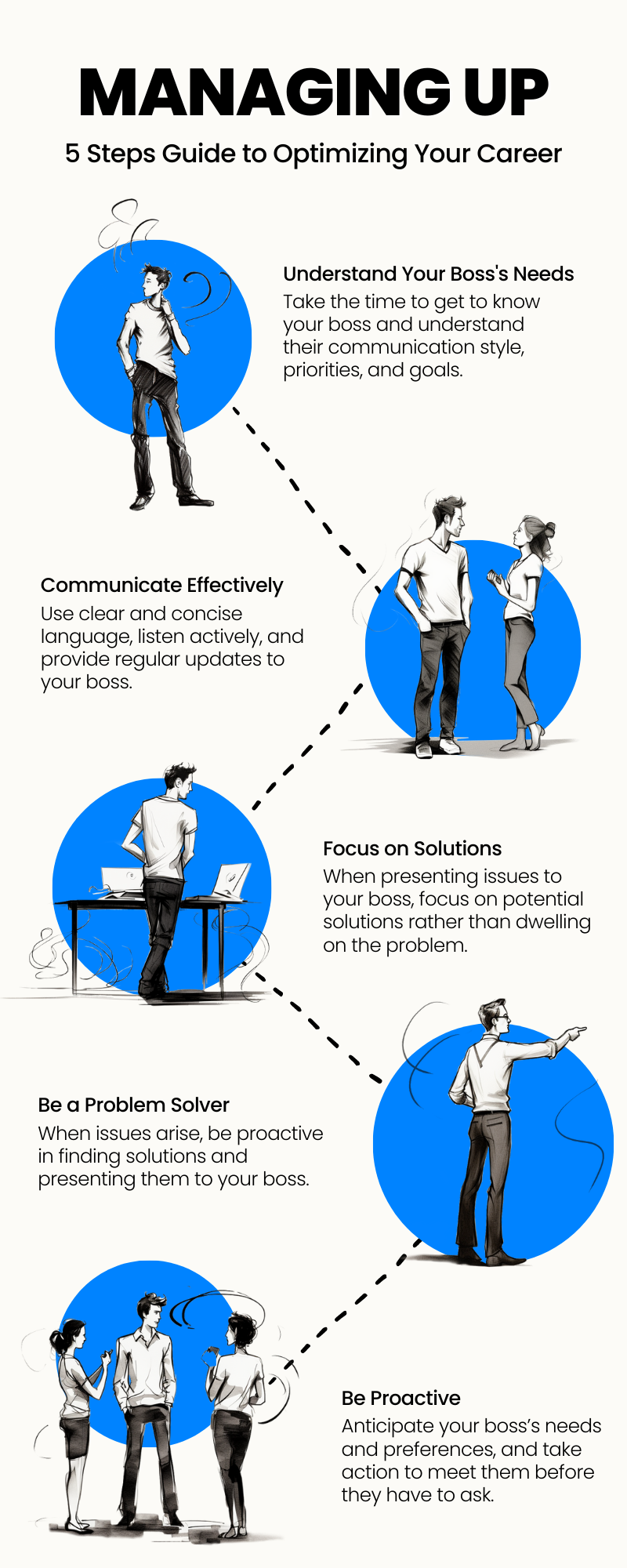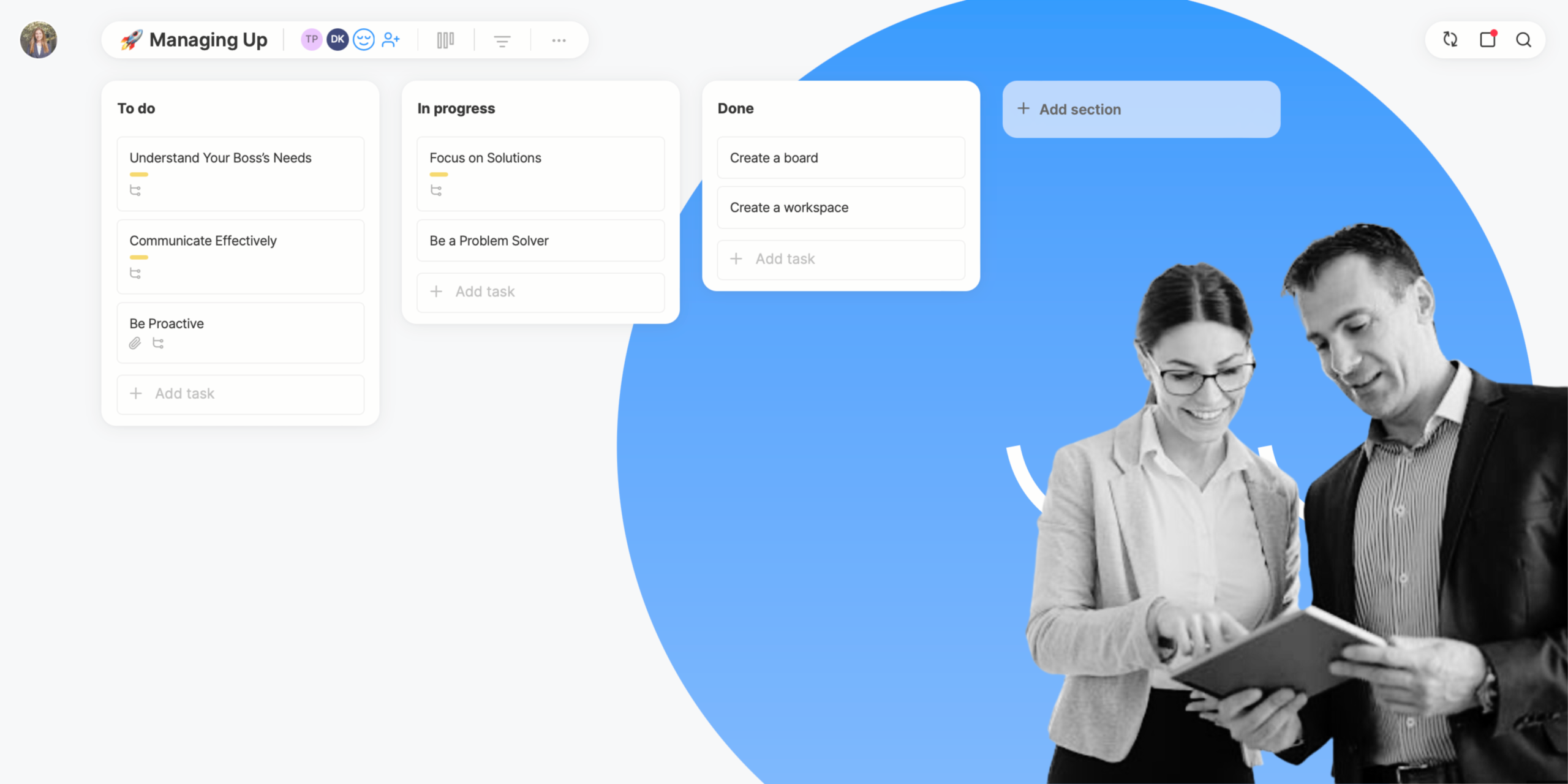If you’re tired of feeling like you and your boss are doing the awkward tango of miscommunication and missed opportunities, It’s time to explore the benefits of managing up and how it can positively impact your professional growth and working relationships.Think of it as the secret sauce to creating a dynamic duo with your superiors, like Batman and Robin, but without the capes. Managing up is an impressive strategy that can help you team up with your boss, overcome challenges, and achieve success. No more struggles, just a new way to make things happen.
But let’s face it, managing up isn’t always easy. There are times when it can feel like you’re walking on a tightrope, trying to balance your own goals with the expectations of your bosses. Don’t sweat it! Managing up is totally within your reach and can be incredibly rewarding when you have the right tools and strategies in place. In this article, we’re going to dive into the world of managing up and explore why it’s such a critical skill to have. We’ll explore what managing up is, why it’s important, and how to do so effectively using Any.do. So, are you ready to learn how to manage up like a pro? Let’s get started!
What is Managing Up?
Welcome to the world of managing up where the key lies in prioritizing relationships with superiors. This involves anticipating their needs and preferences, communicating effectively, and aligning your goals and objectives with theirs. Managing up is not about being a sycophant or trying to manipulate your boss; rather, it’s about building trust, establishing open lines of communication, and working collaboratively to achieve shared goals.
We’ve all encountered that boss who insists on meticulous progress reports that seemingly stretch on for eternity, causing project deadlines to loom overhead. Instead of neglecting your boss’s request or sacrificing project timelines, you decide to manage up. You schedule a meeting with your boss to discuss the situation and propose concise weekly summaries highlighting key milestones, results achieved, and any potential challenges instead of full reports. This way, you ensure regular communication while still allocating sufficient time to focus on project execution.
Your boss appreciates your proactive approach and agrees to try the new reporting format. As a result, you build a stronger working relationship with your boss and demonstrate your ability to manage up by addressing their expectations while ensuring productivity and project success.
Why is Managing Up Important?
Managing up can positively transform your workplace experience. If you have never managed up before you can expect some of these beneficial changes throughout your workday:
- Building Stronger Relationships – By managing up, you can cultivate stronger and more productive relationships with your boss or other superiors, which can lead to greater trust, respect, and collaboration.
- Improving Communication – Managing up involves effective communication, which can help ensure that you and your boss are on the same page and working towards shared goals.
- Advancing Your Career – By establishing a positive relationship with your boss, you may acquire more responsibility and receive more opportunities for growth and development while advancing your career rapidly .
- Increasing Job Satisfaction – When you have a positive relationship with your boss and feel that you’re working towards shared goals, you’re more likely to feel satisfied and engaged in your work.
Tips for Managing Up
Let’s dive into some of the best practices for managing up, including:
- Understand Your Boss’s Needs and Preferences – Take the time to get to know your boss and understand their communication style, priorities, and goals. Be attentive to their non-verbal cues and feedback, and adapt your approach accordingly.
- Communicate Effectively – Use clear and concise language, listen actively, and provide regular updates to your boss. Don’t overlook non-verbal cues because these can be the key to communication.
- Be Proactive – Anticipate your boss’s needs and preferences, and take action to meet them before they have to ask. Approach challenges as opportunities for growth and improvement and don’t be afraid to take initiative.
- Be a Problem Solver – When issues arise, be proactive in finding solutions and presenting them to your boss. Reflect on the problem-solving process and extract valuable lessons for future challenges.
- Focus on Solutions, Not Problems – When presenting issues to your boss, focus on potential solutions rather than dwelling on the problem. Remember, problems are simply opportunities in disguise, and your ability to focus on solutions will propel you forward.
Using Any.do to Manage Up
Talking to your boss can be intimidating at times, but Any.do can be a powerful tool for managing up, as it can help you keep track of tasks, deadlines, and projects and communicate effectively with your boss. Here’s how to use Any.do Workspace to manage up effectively:
- Set Up a Board – Create a Any.do board specifically for managing up. Create lists for tasks, projects, and deadlines, and use cards to track progress and communicate with your boss.
- Use Labels – Use Any.do’s label feature to categorize tasks and projects by priority, deadline, or other factors.
- Assign Tasks – Use Any.do’s card assignment feature to assign tasks and projects to team members, including your boss.
- Use Checklists – Use Any.do’s checklist feature to break down larger tasks or projects into smaller, more manageable steps.
- Share the Board – Share the managing up board with your boss to keep them updated on progress, deadlines, and important information.
Go forth and grow your career with the art of managing up
Now that you have the knowledge and tools to successfully manage up, remember that it’s an ongoing journey and there is always room for improvement. Embrace the idea of continuous growth and always seek ways to refine you’re managing up skills by making managing up an integral part of your professional development.
Managing up goes beyond impressing your boss or climbing the career ladder. It’s about establishing a mutually beneficial relationship, prioritizing effective communication, and understanding your boss’s priorities. This fosters a productive and fulfilling work environment. However, managing up requires a personalized approach as bosses have unique styles and preferences. Be open to trying different strategies, be flexible and adaptable. Embrace growth and become a master of managing up, unlocking exciting opportunities for career advancement.



